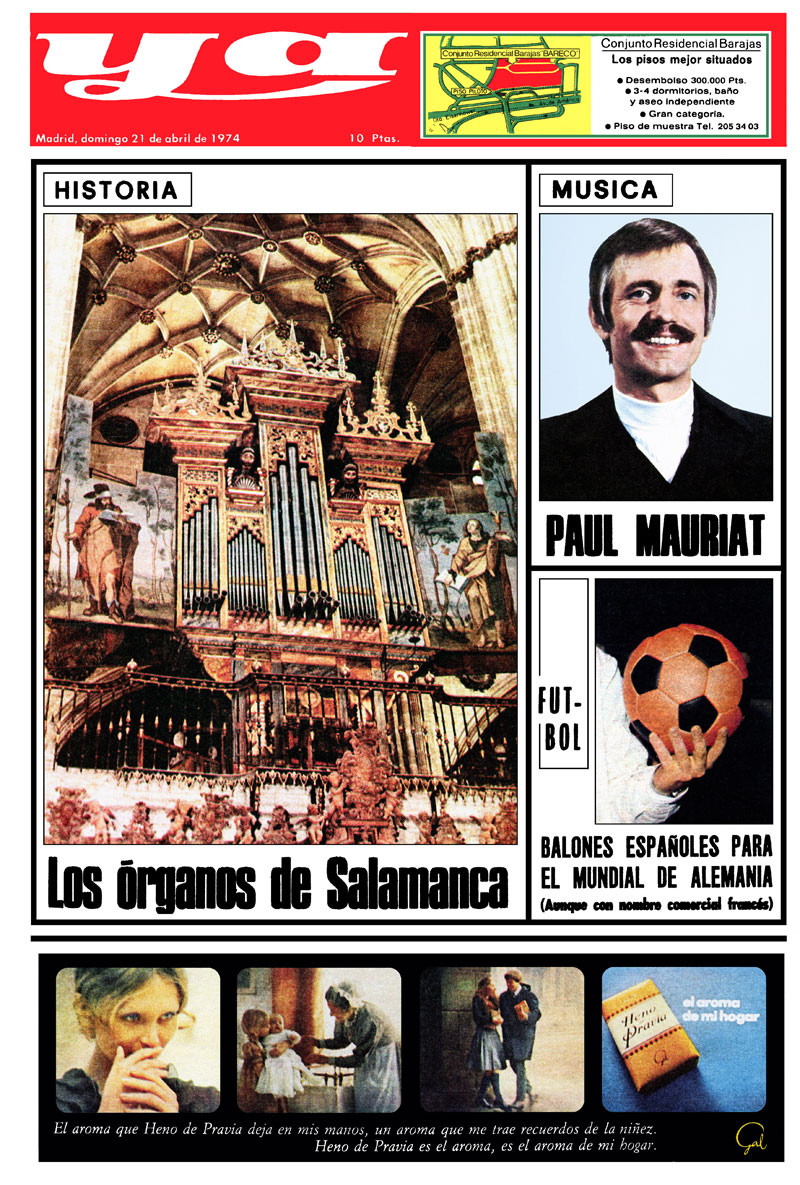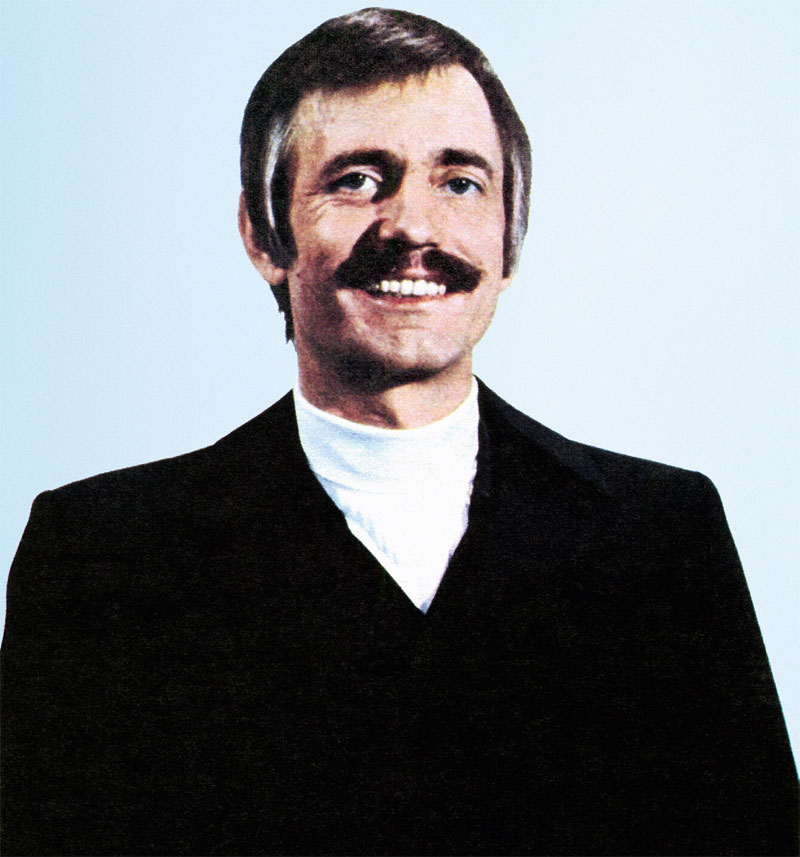INTERVIEW TO PAUL MAURIAT
by "Ya" magazine, Spain, April 21st, 1974
Many, many thanks to Dmitry Zhoukov for providing me this interview!
 A Small Story for a Big Life
A Small Story for a Big Life
PAUL MAURIAT: A creative conductor and a living orchestra
with "Love is blue" conquers the number one "Hit-Parade" all over the world
It is indeed very pleasant to bring to these Sunday pages of the newspaper "YA" the name and the corresponding profile of a figure as universal as Paul Mauriat. Few will be those who ignore the unique ease of this excellent musician to eternalize the successes of the current era and even those belonging to past times. His very successful adaptations and skillful instrumental arrangements of diverse subjects have always earned him the most unanimous applause, earning a reputation for difficult competition. Born French, to the full extent of the word, has the characteristics that are peculiar to the refined artists of the neighboring country. And being in possession of such high qualities and plenty of auspicious circumstances, nothing can surprise us with the consequent expression of initial projects, of primary concerns that, by force, would lead him to the place where he triumph fed occupies and from which in an elegant and right way exercises its indisputable power.
You can't talk about Paul Mauriat without mentioning almost from the outset that he belongs to a family linked to the world of music, with a history that goes back four generations. The French, naturally inclined to culture, have been standing out, for centuries, for their musical wisdom.
Paris was always music
Paul first saw the light in a villa not far from the capital of the Seine. At ten years old he settled with his family in Paris, where he would find the necessary environment for a better development in the pursuit of a more elevated way of life. Little Paul was attracted, like all of his people, to music; that is why he entered the Conservatory. After the rigorous years, he finished his studies, and despite his young age, impatient to help with the expenses at his home, he decided to be a concert pianist, judging himself sufficiently qualified for the dreamed performance. But the scarce income humiliated his good wishes to strengthen the home, and he tried to improve them by dedicating himself to something as good as he thought "jazz" was. And we, very surprised, consider, giving a fun reflection of the thought, that we do not understand, for lack of money that he was, how such idea could come to an eminently inclined man, and sometimes with excess, to the melody; because throughout his long career, nothing creates any indication of any disposition for the music whose origin is typical of the people of color. Of course, discouraged in the middle of such test, he thinks lucidly to move to the field of composition, and in this field he looks happier; however, he feels or finally discovers that his definitive future would be to be an orchestra conductor. In his first phase, he still did not have his own ensemble, but used the existing ones in the studios of the main record houses of France and accompanying music personalities such as Mireille Mathieu. He began to stand out for the flair that he put in the orchestral arrangements, in which he managed to make the vocals of the performers stand out with natural simplicity. And here was his success, because the requested singers demanded to the record labels to be directed by the only one who had the rare secret of preserving the orchestral force while still keeping the human voice in the foreground. The song-loving crowd, connoisseur of the skills of Mauriat, in a height of appetite, insistently asked for records that joyfully existed in their desire, in their imagination, all of them with the prestigious name and guarantee of Paul Mauriat. Thus, with this free, spontaneous, sincere propaganda, our man forced himself to form his own orchestra, which today appears - within the melodic and even somewhat grandiloquent genre - as one of the highlights of the world.

Paul Mauriat when he received the news that "Love is blue" is number 1 in the United States
Two visits to Spain
On two occasions Mauriat was in Spain, and here in Madrid. One was in 1968, and the other one, two years ago. In both fleeting visits I was part of the press conferences that his presence motivated, always with the aim of being able to provide our readers with information. From my transfer to the hotel where he resided briefly in each of those two times, I keep a living memory. I was able to know in depth his way of thinking and I gathered the most important impressions of a very pleasant talk, of a quiet conversation, rich in humanity, in examples, in sensible lessons, in humor and in sympathy.
Paul is a cordial man and with a delicious sense of joke. His gesture is smiling. He is endowed with enormous sagacity and is one hundred percent French in character and appearance. We would say that he wins by several positive points to the French type.
A commentator, wanting to catch him off guard on one of the journalistic rounds, asked:
- Tell us, Mr. Mauriat: Is this irony that you show off, French or nothing more than Paul Mauriat?
- What do you think? - Asked the questioner.
- It's me who asks the questions! - the commentator said somehow angry.
To which Mauriat, after biting his lips, quietly cleared his throat and twisted his mouth with a mocking air, said:
- Well ... - he hesitated - let's say it's French. But I wonder: What will French irony be like? ... And what would Paul Mauriat's irony really be like? Because, as you cannot be asked ..., I must find it out myself or remain with the doubt ...

Saying the last sentence he stood up, took a long sip slowly, creating a kind of "mini-suspense", and finally added:
- I also wonder, and in turn, and I do not care that you and others hear it: Will your question be Spanish ... or nothing but yours? Because everything Spanish seems interesting to me ... and you have traces of an individual of character, of cunning, intelligent and friendly Spanish. Come on, I like you!
We all laugh openly.
Sacrifice and Tenacity
Continuing with the little history of Mauriat's life, we now remember his beginnings with his first group, when his greatest and fiery desire was not to achieve just another ensemble, but one that with study, sacrifice and tenacity could crystallize in a total and glazed perfection. In this way, Mauriat would incorporate a splendid sound balance to France with his arrangements and practical and artistic teachings in the midst of a severe orchestration for a "pop" song of the moment, of a song that, shortly after given birth and served by its legitimate creators, died languidly or were about to die, unless Mauriat himself took them as his own and filled them with the transcendental finesse, the notorious packaging that freed them from death or resurrected them with the almost biblical sound of their regenerating and heraldic instruments.
- What have been your greatest professional satisfactions, Mr Mauriat? - I asked him in one of the moments when I could interrogate him alone.
- Look ..., great satisfactions I have had many. Among them, those of having conducted the songs of Charles Aznavour. What a smart man! And, of course, I cannot deny, because I will fool myself, that another of my greatest satisfactions, and more frequent, is to choose a hit-song, see it with loving breadth, make the pertinent arrangements and then sit comfortably to personally carry out the mixtures, work that captivates me and transports me to regions equivalent to those of an enchanted boy who dreamed of being a great engineer while playing to build with his "meccano" a bridge of exalted invoice ...
- Do you get along well with singers in general and with other colleagues?
- I think so! You see: Mireille Mathieu, whom I have known since she was very small, I not only appreciate her, but I love her as if she were a daughter: she is a delightful woman.
- How did you react to the triumph of your melodic creation "Love is blue" in the United States and then in the rest of the world?.
- The truth is that at first, when they told me, I thought it was a joke; then you will remember that when it participated in the Eurovision 68 absolutely nothing happened with it, and how many months had passed ... What filled me with intimate joy was to verify that the primary success was due to my own instrumentation, to the impeccable interpretation of my [orchestra], which, excited, shared the bliss creating the tightest musical ensemble ever desired.
- Many, with the confusion produced by the triumph attached to the name of your orchestra, believe that it is a melody composed by you, but it is not yours, right?
- Obviously not. I have been able to verify with some sadness that everywhere they forgot their true authors, Cour and Popp, believing that I am not only the arranger of it, but its absolute creator.
- What do you think of yesterday's music ...; I mean that of the thirties, forties ...?
- Almost entirely, wonderful. And for me, more than yesterday, just nostalgic: maybe yesterday, but from today too, and tomorrow ... There you have the theme of Charles Trenet‘s " Que reste-t-il de nos amours?" ("What remains of our loves?"), which is the "leifmotiv" of the Truffaut rrangois film "Stolen Kisses" and performed by Trenet himself in his original version, as he sang it twenty-seven years ago ...
Restless and, at the same time, Restful Temperament
Paul Mauriat, a person of great conversation and highly optimistic spirit, a figure of uninterrupted current affairs, who takes his humor to the point of boasting that he is a man of small stature, told us that what bothered him most about the current life of society in that we have to live through traffic, traffic jams. His nerves did not oil that life is so overwhelmed ...
Mauriat is a man with a restless temperament and, at the same time, rested ... We know for himself that he likes cinema a lot. And he told us about it:
- As you will remember, since I created my orchestra I don´t usually forget the musical themes written for the cinema and which deserve outstanding attention for their quality.
- Which of those themes have given you more success?
- Possibly the melodies that Francis Lai wrote for the Lelouch films "A man and a woman" and "Live to live".
- Do you know any of our musicians?
- Indeed, I will mention Augusto Algueró, whom I consider a good arranger and magnificent composer; his songs are very successful and many reach a great category; I will say, for example, "Penelope".
Rostrum of Honor
Paul Mauriat, serious and joker, small ... and huge, simple and with the complicated life of the different, artist and deeply human, French and universal ..., came today to these Sunday pages of "YA" so that, with the respect and veneration that he deserves, occupy the rostrum of honor, from which we and all the followers of those who work for good music and exercise their art proffession with dignity and efficiency, offer him excited tribute with the highest gratitude.
Juan María Mantilla